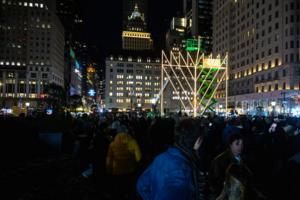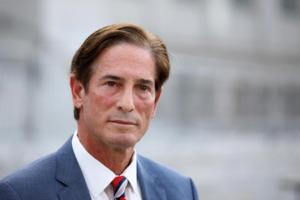Current News
/ArcaMax
Man in 20s detained as 'person of interest' in Brown shooting
PROVIDENCE – Police have detained a person of interest, a man in his 20s, in connection with a shooting that killed two students and injured nine others at Brown University Saturday.
Providence Police Chief Oscar Perez confirmed the detainment and little else at a press conference Sunday afternoon inside a fire station a few blocks from where...Read more

NYPD steps up security at synagogues, Hanukkah celebrations after Bondi Beach shooting
The NYPD will increase its presence at public Hanukkah celebrations and synagogues after a pair of gunmen killed at least 12 people at Australia’s Bondi Beach, as New York City elected officials condemned the attack Sunday.
“We are closely monitoring the horrific attack … We are in touch with our Australian partners, and at this time we ...Read more

Zelenskyy eyes US guarantees as he meets with Witkoff, Kushner
President Volodymyr Zelenskyy signaled that Ukraine could accept security guarantees from the U.S. and Europe as a way to prevent future Russian aggression, and substitute for its long-term goal of joining NATO.
Ukraine’s leader is meeting at Germany’s Federal Chancellery in Berlin on Sunday with a U.S. delegation led by Special Envoy ...Read more

Hassett says Trump would be free to offer opinions on Fed policy
National Economic Council head Kevin Hassett said he’d consider President Donald Trump’s policy opinions if picked to lead the Federal Reserve, but that the central bank’s interest rate decisions would remain independent.
The president “has very strong and well-founded views about what we ought to do,” Hassett, Trump’s top economic ...Read more

Person of interest detained over Brown University shooting
A person of interest in Saturday’s shooting at Brown University that left two people dead and nine injured has been detained after an extensive manhunt, officials said.
The shooting occurred in a classroom on the second day of final exams for the fall semester at the Ivy League institution, which has a student population of about 11,000. ...Read more

Ancient lake from ice age comes back to life in Death Valley after record rainfall
Between 128,000 and 186,000 years ago, when ice covered the Sierra Nevada, a lake 100 miles long and 600 feet deep sat in eastern California in what is now the Mojave Desert.
As the climate warmed and the ice retreated, the lake dried up, leaving a white salt pan in its place.
But a November of record rainfall has brought the ancient lake, ...Read more

Murdaugh, Susan Smith and more -- here's what some infamous SC criminals have done behind bars
COLUMBIA, S.C. — Their names became well known due to their crimes — a school shooter, a lawyer convicted of killing his wife and son, two mothers who killed toddlers.
James Wilson Jr., Alex Murdaugh, Susan Smith and Ariel Robinson — they were convicted and sent to prison — but what happened next?
The South Carolina Department of ...Read more

From bean to cup, Colombian women are taking on the coffee patriarchy
The lush coffee trees that blanket the misty hills of the Huila region in southwestern Colombia bear witness to a struggle.
From bean to steaming cup, women are slowly making gains across the South American country’s prized coffee industry, challenging a patriarchy that’s prevailed for generations. Some are running their own farms, while ...Read more

Voting by mail faces uncertain moment ahead of midterm elections
Derrin Robinson has worked in Oregon elections for more than 30 years, long enough to remember when voters in the state cast their ballots at physical polling sites instead of by mail.
As the nonpartisan clerk of Harney County, a vast, rural expanse larger than Massachusetts, Robinson oversees elections with about 6,000 registered voters. ...Read more

As California delays 'zone zero' wildfire protection rules, study finds clearing vegetation prevented home damage in LA fires
SAN JOSE, Calif. — As California again delays controversial rules requiring homeowners in fire-prone areas to maintain a 5-foot “ember-resistant” zone around their houses, a new report finds that properties that were already close to that standard were much less likely to be destroyed in the devastating Los Angeles wildfires in January.
...Read more

Some big water agencies in farming areas get water for free. Critics say that needs to end
LOS ANGELES — The water that flows down irrigation canals to some of the West’s biggest expanses of farmland comes courtesy of the federal government for a very low price — even, in some cases, for free.
In a new study, researchers analyzed wholesale prices charged by the federal government in California, Arizona and Nevada, and found ...Read more
China warns against Japanese militarism at massacre memorial
China warned against a return of Japanese militarism at a memorial ceremony Saturday honoring victims of a wartime massacre, while refraining from directly criticizing Japan’s leader amid escalating tensions between the two nations.
Speaking at a ceremony in Nanjing, Politburo member Shi Taifeng recounted the violence of the Japanese capture ...Read more

Brown University gunman at large after shooting leaves two dead
A shooting at Brown University in Providence, Rhode Island has left two people dead and nine injured, with a manhunt underway for the attacker.
The shooting occurred in a classroom on the second day of final exams for the fall semester at the Ivy League institution, which has a student population of about 11,000. The male suspect was dressed in...Read more

Two dead, eight injured in shooting at Brown University
Two people were killed and eight were injured in a shooting at Brown University in Rhode Island, Providence Mayor Brett Smiley said Saturday. The attacker was still at large.
The shooting occurred on the second day of final exams for the fall semester at the Ivy League institution, which has a student population of about 11,000.
“The ...Read more

NYPD deploying more cops to NYC universities after Brown U. mass shooting
NEW YORK — The New York Police Department announced Saturday that it’s deploying extra cops to local universities in response to the deadly mass shooting at Brown University.
The Police Department said there was no known threat or connection to the Big Apple from the shooting that occurred shortly after 4 p.m. at the Ivy league college’s ...Read more

Feds link two SoCal men to Sinaloa cartel: One heads to prison, the other is missing
LOS ANGELES — Two men linked to a Downey residence that authorities say was a smuggling hub for Mexico's Sinaloa drug cartel faced sentencing this year before a federal judge.
One appeared last week in a Sacramento courtroom to learn his fate.
The other has been missing for months.
Julio Cesar Nevarez-Erunez, 24, was sentenced to nearly six...Read more

Notorious 'winter vomiting bug' rising in California. A new norovirus strain could make it worse
LOS ANGELES — The dreaded norovirus — the "vomiting bug" that often causes stomach flu symptoms — is climbing again in California, and doctors warn that a new subvariant could make even more people sick this season.
In L.A. County, concentrations of norovirus are already on the rise in wastewater, indicating increased circulation of the ...Read more

Hungary protest against child abuse raises pressure on Orban
Tens of thousands of Hungarians took to the streets on Saturday as a video depicting abuse at a state-run juvenile facility added to pressure on Prime Minister Viktor Orban four months before elections.
Protesters marched from downtown Pest across the Danube to Buda castle where Orban and his ally President Tamas Sulyok have their offices. ...Read more

South Bay households to receive more air purifiers as sewage crisis persists
SAN DIEGO — The San Diego County Air Pollution Control District’s (APCD) governing board voted unanimously Thursday to expand its air purifier distribution program for South County residents affected by cross-border pollution from the Tijuana River sewage crisis.
The board approved up to an additional $1 million for the Air Improvement ...Read more

ICE agents visit Minnesota coffee shop, arrest cook after ruse to get him outside
MINNEAPOLIS — An Ecuadorian man was arrested Friday at a coffee shop in Brooklyn Park after Immigration and Customs Enforcement agents summoned him to the parking lot in a ruse to get him outside.
The man was a cook at Crumbs & Coffee on Zane Avenue N.; his employer didn’t want to reveal his name.
Crumbs & Coffee co-owner Charles Spies ...Read more
Popular Stories
- NYPD deploying more cops to NYC universities after Brown U. mass shooting
- Person of interest detained over Brown University shooting
- Murdaugh, Susan Smith and more -- here's what some infamous SC criminals have done behind bars
- Ancient lake from ice age comes back to life in Death Valley after record rainfall
- A young hiker has been missing for a month on Mount Whitney. Are time and hope running out?





